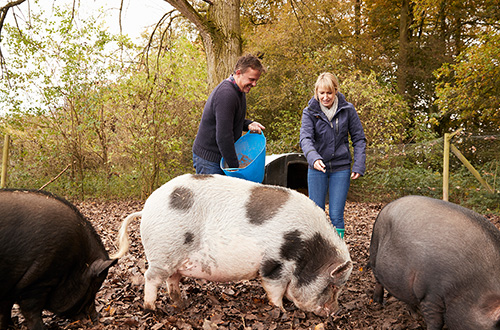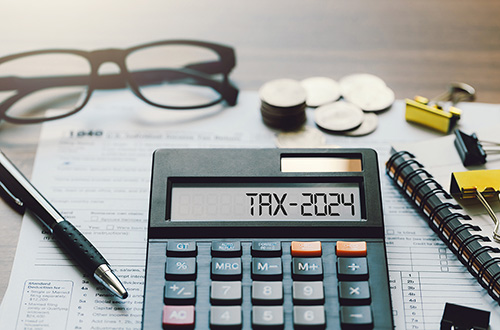As we approach the end of the 2025/26 tax year, now is the perfect opportunity to consider actions to improve your tax position.
Pension contributions
During the 2025/26 tax year, individuals are able to contribute up to £60,000 (gross) into their pension scheme. For those earning over £200,000, this may be reduced. The amount a person can contribute is capped at their relevant earnings; in most cases, this will be their employment income. For those with no relevant earnings, including children, the limit is £2,880 net (£3,600 gross).
Personal pension contributions attract basic rate tax relief at source, meaning that a £60,000 gross contribution only requires a personal payment of £48,000. For higher and additional rate taxpayers, additional relief is given by extending the basic rate and higher rate tax bands.
Pension contributions also extend the threshold at which the personal allowance is tapered and the high-income child benefit clawback begins; these are normally £100,000 and £60,000, respectively. For those earning between £100,000 and £125,140, pension contributions can provide relief at an effective rate of 60% due to the way they preserve the personal allowance.
For those who have held a pension scheme in the previous three tax years but haven’t fully utilised their allowances, any unused brought forward allowances can be used to increase their limit in the current year. Contributions made in the 2025/26 tax year will utilise this year’s allowance first before utilising the allowances brought forward on a first-in, first-out basis. Therefore, any brought forward allowances from the 2022/23 tax year will be lost if they are not used by 5 April 2026.
Be aware that contributions made by an employer also use this allowance and must be taken into account when calculating the pension position. If you exceed the annual allowance, you may be at risk of incurring a pensions savings tax charge.
ISA allowance
The ISA allowance for 2025/26 remains at £20,000, and the junior ISA allowance is £9,000. This amount can be split across any number of cash or stocks & shares ISAs but cannot be carried forward. Therefore, any allowance not used by 5 April will be lost. Any income and growth made within an ISA wrapper is tax-free, so these are very tax-efficient investments.
Preserving the personal allowance
Tax brackets are once again frozen, which, coupled with the rise in inflation over recent years, means more people are suffering tax at higher rates. For those now earning over £100,000, the personal allowance is tapered by £1 for every £2 earned. This means the personal allowance is fully tapered once income reaches £125,140, which is also the threshold at which the 45% additional rate of tax is suffered.
As mentioned above, the marginal rate of tax between £100,000 and £124,140 is 60%, which means that ways of preserving the personal allowance are extremely beneficial. One way to do this is by making personal pension contributions; another is by making charitable donations through the gift aid scheme.
Donations must be made to a UK-registered charity, and the option to claim gift aid must be selected. Donations made in this way are made net of tax and enable the charity to claim the gross amount of the donation, which includes a 20% uplift. Similarly to pension contributions, gift aid donations are grossed up at 20%, and the basic and higher rate bands are extended by the gross amount. This means that the level at which the personal allowance is tapered and child benefit is clawed back is increased.
Capital Gains Tax (CGT)
For 2025/26, the annual exempt amount (AEA) for Capital Gains Tax has been reduced to £3,000, and the rate of CGT payable is 18% for basic rate and 24% for higher rate taxpayers. This AEA is available to everyone, including children, but cannot be carried forward into future tax years. The reporting threshold for Capital Gains Tax is four times the annual allowance, meaning that any disposals of £12,000 or more are reportable to HMRC.
Most gains/losses are reportable on a person’s self-assessment tax return; however, disposals of UK residential property by UK residents where Capital Gains Tax is payable must be reported to HMRC within 60 days of completion, using a Capital Gains online UK Property return. For non-UK residents, all UK land and property disposals need to be reported online within 60 days.
For spouses and civil partners, transfers of assets can be made on a no gain/no loss basis. This can be beneficial if a capital disposal is planned and both individuals’ have their AEAs available. It can also be beneficial if one partner pays tax at the higher rate while the other has some/all of their basic rate band or capital losses available.
Inheritance Tax (IHT)
The gift allowance for the current tax year is unchanged and remains at £3,000. This means that the first £3,000 of gifts can be made without IHT implications; gifts of more than £3,000 will become chargeable if the donor dies within seven years of making the gift. Any unused allowance from the 2024/25 tax year can also be utilised, meaning the maximum an individual can gift without IHT implications is £6,000 during the current tax year.
Dividend allowance
The annual tax-free dividend allowance has remained unchanged. However, the tax rate on dividends is increasing from April to 10.75% and 35.75%, with the additional rate remaining at 39.35%. If you are able to draw dividends and haven’t already done so, the tax-free amount is worth utilising. If your planned income is below the threshold and you intend to take dividends in the coming months, it may be worth considering paying them before the rate increases, although the acceleration of the tax payment by 12 months should also be taken into account.
Tax efficient investments
There are various investments available that provide income tax and CGT relief. Please note that in each investment option, income tax relief is limited by reducing any income tax liability to nil; they cannot create a repayment position.
Enterprise Investment Scheme (EIS)
These investments offer income tax relief of 30% of the total investment up to a maximum annual limit of £1 million; this is increased to £2 million if the investment is made into knowledge-intensive companies. Any investments made can be carried back to the prior tax year where the annual allowance was not fully utilised.
Capital gains realised up to the investment amount can also be deferred until the EIS shares are disposed of.
Seed Enterprise Investment Scheme (SEIS)
These investments offer income tax relief of 50% of the total investment up to a maximum annual limit of £200,000. Any investments made can be carried back to the prior tax year where the annual investment allowance was not fully utilised.
Capital gains realised of up to 50% of the SEIS investment value can be made exempt from Capital Gains Tax.
Venture Capital Trust (VCT)
These investments offer income tax relief of 30% (reduced to 20% from April 2026) of the total investment up to a maximum annual limit of £200,000. These investments cannot be carried back to the prior tax year. Any dividends received on VCT investments are exempt from income tax.
Food for thought
Residence changes
From 6 April 2025, the concept of domicile has been removed from the UK tax system and replaced by a set of rules based on a person’s residency status. Broadly speaking, if a person is classed as a UK tax resident for a tax year, they will be subject to UK income tax on their worldwide income and gains.
Similarly, if an individual has been a UK resident for 10 of the prior 20 tax years upon death, their worldwide assets may be subject to UK Inheritance Tax. It may therefore be worthwhile to review your residency position and future plans to minimise your future tax liabilities in the UK.
For UK-resident non-domiciled individuals who previously claimed the remittance basis, a facility to bring funds to the UK at a reduced tax rate is available. This may provide a tax‑efficient way of bringing funds to the UK or cleaning up mixed funds, if it is expected that the funds will be brought to the UK in future. This facility is only available until April 2028.
APR and BPR changes from 6 April 2026
From 6 April 2026, the availability of these reliefs will be capped at £2.5 million per person, with these allowances being transferable on death. Inheritance Tax thereafter will be payable at 20% thereafter on business assets.
For investments in the AIM market, the £2.5 million relief will not be available; inheritance will be payable on the value of these shares in excess of the nil rate band, at 20%.
Pensions forming part of the taxable estate from 6 April 2027
Previously, most pension funds fell outside of a person’s estate for IHT purposes. However, from 6 April 2027, this will no longer be the case; this could dramatically increase your inheritance tax exposure.
It may therefore be beneficial to review your IHT position ahead of these changes taking effect.
This is intended as a summary and overview of the tax situation and does not constitute financial advice. No action should be taken without first seeking professional advice specific to your circumstances.
Information accurate as at February 2026.
If you have any questions about the above, or would like more information specific to your circumstances, please enter your email address below and we will get in touch:
















